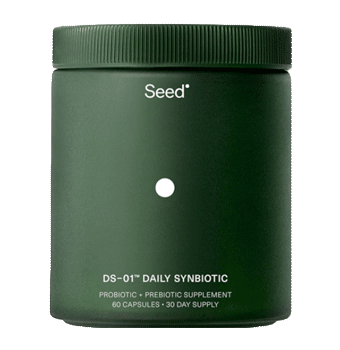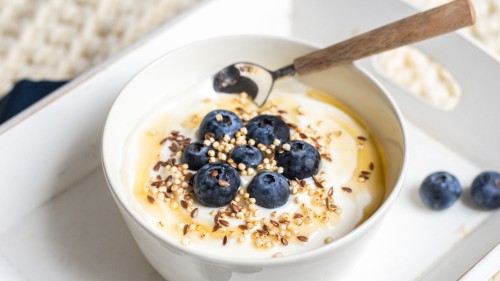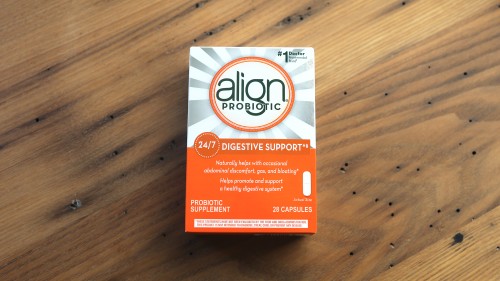WellnessVerge is reader-supported. We may earn a commission when you make a purchase through the links on this page. Learn more about our process here.
How and When to Take Probiotic Supplements
Last Updated on May 10, 2021
Medically Reviewed by Anthony Dugarte, MD
Taking a probiotic supplement can provide health benefits — when used as directed and for the right reasons. In this article, we discuss when it’s most beneficial to take probiotics and a few other important considerations.


Having an unhealthy balance of bacteria in our body has been associated with various health ailments such as gastrointestinal disorders, obesity, immune disorders, and mental health problems.
Probiotics can help to increase the number of health-promoting bacteria and decrease the number of disease-causing ones.
It is therefore in our best interest to understand how and when to take probiotics for optimal health.
What Are Probiotics?
Probiotics are live, beneficial bacteria that provide multiple health benefits.
While typically we think of bacteria as being bad or harmful, probiotic bacteria actually promote health and serve many important functions in our bodies. (1)
There are several ways to increase the number of beneficial bacteria in your gut, either from food or probiotic supplements.
Probiotic-containing foods, sometimes called fermented foods, include yogurt, kefir, sauerkraut, tempeh, miso, and kombucha.
Since many of us do not get enough probiotics in our diets, a probiotic supplement can be a great alternative.
A probiotic in supplement form may also contain a larger number of beneficial bacteria than what is found in a typical diet.
In order for bacteria to be considered a probiotic, they must meet certain criteria. It must be isolated from a human, survive in your intestine after being eaten, have a proven health benefit, and be safely consumed.
When to Take Probiotic Supplements
Before we dive deeper into probiotics and your health, it’s important to know how and when to take probiotics.
There are many reasons someone may choose to take a probiotic, such as improving digestion, taking antibiotics, or improving overall health.
While our bodies naturally contain both good and bad bacteria, sometimes the bad outweighs the good. This condition is called dysbiosis and can happen for several reasons:
- High consumption of sugar, highly processed diet
- Excessive alcohol intake
- Recent antibiotic use or prolonged use of antibiotics
- Poor dental hygiene
- Increased stress or anxiety
Diet choices play a large role in the types of bacteria found in our intestinal tract.
A high-fiber diet is associated with increased numbers of beneficial bacteria. Alternatively, a low-fiber, high-sugar diet increases the bad bacteria. (2)
Because most Americans are not meeting the recommended 25–35 grams of fiber per day, it is very common to have an unhealthy level of disease-causing bacteria. (3)
Dysbiosis can cause a number of uncomfortable symptoms. These include:
- Bloating
- Gas
- Upset stomach
- Constipation
- Diarrhea
- Fatigue
- Bad breath
- Brain fog or difficulty concentrating
- Depression
- Anxiety
- Poor immune function
- Inflammation
Keeping the right balance of bacteria in the gut can help improve these symptoms so that the body can function optimally.
You may be on the fence and not sure if taking a probiotic is right for you. There are a few common situations where you may be more in need of one, and it may be of more benefit:
- You have significant digestive problems such as gas, indigestion, bloatedness, or constipation.
- You were recently on antibiotics or have been on them several times.
- You recently had food poisoning.
- You have skin issues that demonstrate inflammation, such as acne, eczema, rashes, or psoriasis.
- You have allergies or asthma.
- You have frequent yeast infections.
Before starting on a probiotic, always discuss your individual symptoms with your doctor to ensure there isn’t a more serious underlying medical cause.
Related: How to Choose the Best Probiotic Supplement
When to Take Probiotics with Antibiotics
You may also be wondering when to take probiotics with antibiotics.
While antibiotics are often necessary, they can also alter the balance of healthy bacteria in the body and cause side effects such as gas, bloating, and diarrhea.
It is generally recommended if you are taking an antibiotic also to start taking a probiotic.
Probiotics have been shown to be effective for both preventing and treating diarrhea associated with antibiotic use. (4)
In general, it is recommended to take your probiotic at least 2 hours before or after your antibiotic.
This will ensure that they won’t interact and the antibiotic doesn’t try to kill off the good bacteria in the probiotic.
The probiotic should continue to be taken after the antibiotic course has been completed to continue to build up the beneficial bacteria.
What Is the Best Time to Take Probiotics?
You may be wondering when is the best time to take probiotics – morning or evening? Or, are they better to take on an empty stomach, or with meals?
Research shows that probiotics are typically better absorbed when taken on an empty stomach rather than with food.
Most probiotic manufacturers recommend taking them 30 minutes before a meal. This is because many probiotic strains cannot withstand the acidic environment in the stomach.
When taking them on an empty stomach, the probiotics travel through the stomach more quickly, increasing survival chances.
They can then reach the intestines faster, where they are best absorbed. The time of day does not seem to matter when it comes to probiotics.
For example, Lactobacillus and Bifidobacterium strains appear to survive best when taken up to 30 minutes before a meal. (5)
However, some research shows if taking probiotics with food, taking them with fat-containing foods may help improve absorption.
For best results, follow the instructions for timing on the probiotic label.
Regardless of timing, what is perhaps even more important is the consistency in taking your probiotics.
It is best to take them at the same time each day, so you are most likely to remember.
How Long Does It Take for Probiotics to Work?
How long it takes for probiotics to work is dependent on several factors such as what you’re taking it for, what type of strain it is, and the dose.
Most reports show that it can take anywhere between 2–6 weeks to start seeing results from taking probiotics. However, it is likely that even more benefits are seen in taking them longer.
Being patient and taking your probiotic for at least a few months will yield the biggest benefits, as it takes some time for the healthy bacteria to build up in your body.
Probiotic Dosing
Probiotic supplement doses range between 1 to 50 billion colony-forming units (CFUs).
If you are new to taking probiotics, it is generally recommended to start with a supplement containing at least 1 billion CFUs.
There is not enough research yet on the best dose for maximum benefits, but there are likely many variables.
In general, it is suggested to start small, and as you develop a tolerance for a particular dose, you can slowly increase it over time.
The Bottom Line
Probiotics are a safe supplement that can help relieve digestive discomfort and provide other health benefits.
Taking them on an empty stomach can help improve absorption.
Probiotics may be particularly beneficial after a round of antibiotics when taken at the right time.
Like any new supplement or medication, I would always suggest consulting with your medical provider before starting a probiotic supplement.
At WellnessVerge, we only use reputable sources, including peer-reviewed medical journals and well-respected academic institutions.
- Impacts of Gut Bacteria on Human Health and Diseases:
https://www.ncbi.nlm.nih.gov/pmc/articles/PMC4425030/ - The Microbiome:
https://www.hsph.harvard.edu/nutritionsource/microbiome/ - Dietary Guidelines for Americans 2015-2020, Eighth Edition:
https://health.gov/sites/default/files/2019-09/2015-2020_Dietary_Guidelines.pdf - Prescribing an antibiotic? Pair it with probiotics:
https://www.ncbi.nlm.nih.gov/pmc/articles/PMC3601687/ - The impact of meals on a probiotic during transit through a model of the human upper gastrointestinal tract:
https://pubmed.ncbi.nlm.nih.gov/22146689/







